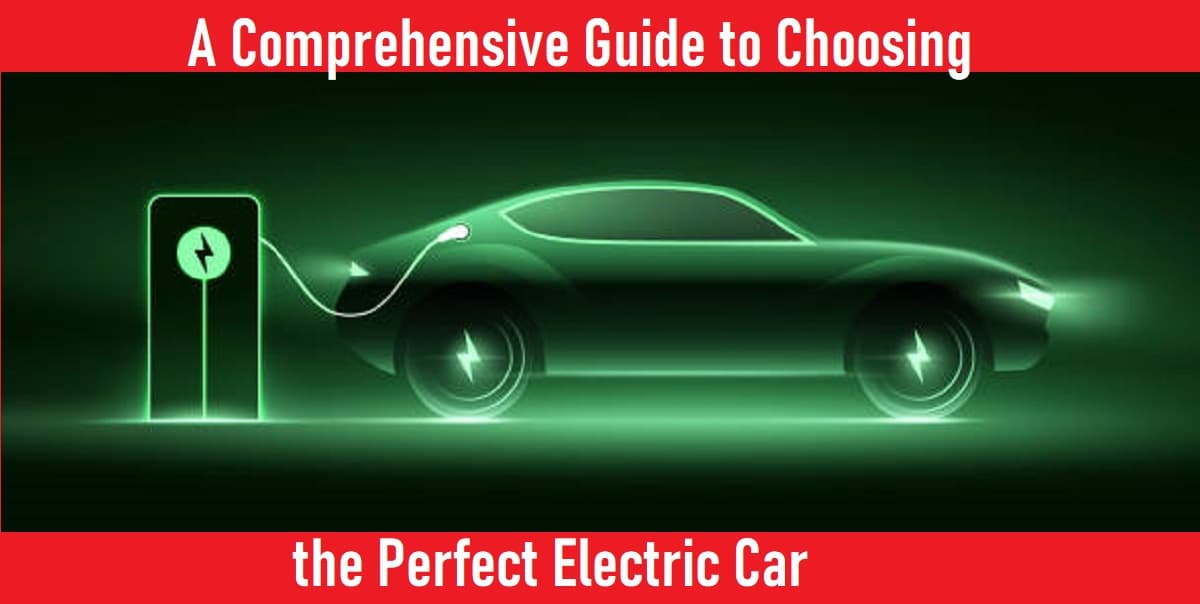Are you considering making the switch to an electric car? With the automotive industry undergoing a rapid electrification revolution, there’s never been a better time to explore the world of electric vehicles (EVs). In this comprehensive guide, we’ll walk you through the essential factors to consider when looking for the perfect electric car.
Range: Defying Range Anxiety
When it comes to electric cars, one of the first factors that often comes to mind is range. Range refers to the distance an electric vehicle can travel on a single charge. Gone are the days when early EVs struggled to cover 180 miles on a single charge, leaving drivers with what’s infamously known as “range anxiety.” Today, technological advancements have dramatically improved EV ranges.
Table 1: EV Range Comparison
| Early EVs (10 years ago) | Modern EVs (e.g., Tesla Model S) | |
|---|---|---|
| Range | 180 miles or less | 405 miles and more |
While you can still find affordable EVs with a range of 200 to 300 miles, these figures are more than sufficient for the average American’s daily driving needs. Range anxiety is becoming a thing of the past.
The Best Affordable EV: Hyundai Kona Electric
If you’re on the hunt for an affordable electric car that delivers on both range and value, the Hyundai Kona Electric deserves your attention. Starting at around $33,000, this urban runabout offers a usable range of approximately 258 miles. It’s ideal for city driving, where it can last for several days before needing a recharge.
Table 2: Hyundai Kona Electric Highlights
| Hyundai Kona Electric | |
|---|---|
| Starting Price | $33,000 |
| Range | Approximately 258 miles |
| Ideal for | City driving, affordability |
Moreover, the Chevrolet Bolt, with a range of around 258 miles, is another strong contender in the affordable EV segment. It’s worth noting that the Kona Electric is due for a next-generation update, which promises to make it even more appealing.
Efficiency: Miles Per Kilowatt-Hour
Efficiency is a crucial metric for evaluating electric cars. Think of the battery’s efficiency as miles per gallon (MPG) in traditional gasoline-powered vehicles. In the EV world, it’s measured in miles per kilowatt-hour (kWh). If your goal is to save money and reduce environmental impact, efficiency should be a top consideration.
Table 3: Most Efficient EV – Hyundai Ioniq 6
| Hyundai Ioniq 6 Long Range RWD | |
|---|---|
| Efficiency | 4.17 miles per kWh |
| Equivalent to | Approximately 140 MPG |
The Hyundai Ioniq 6 Long Range RWD boasts an impressive efficiency of 4.17 miles per kWh, equivalent to approximately 140 MPG in a gasoline car. A more efficient EV not only saves you money on charging but also often allows for a smaller battery, which contributes to better driving dynamics and reduced maintenance costs.
Charging Speed: Fast and Convenient
Charging speed is a critical consideration, especially if you frequently embark on road trips or live in an area with limited charging infrastructure. While slow charging at home overnight is convenient for daily commuting, fast DC (direct current) charging becomes essential for long journeys.
Table 4: Charging Speed Comparison
| Slow Charging (Home) | Fast DC Charging (On the Road) | |
|---|---|---|
| Time for 10-80% Charge (e.g., for Bolt or Kona EV) | Over 40 minutes | Faster options available |
For instance, the Kia EV6 offers rapid charging, taking as little as 18 minutes for an 80% charge. However, the availability of charging stations with sufficient power capacity can influence your experience. It’s essential to know the charging infrastructure in your area.
Price and Incentives: Beyond the Sticker Price
Electric cars, on average, tend to be more expensive upfront compared to their gasoline counterparts. However, don’t let the sticker price deter you, as government incentives can level the playing field. Federal and state incentives, such as the $7,500 Federal EV tax credit, can significantly impact your final cost.
Table 5: Impact of Incentives – Example with Volkswagen ID.4
| Without Incentives | With Federal Tax Credit | |
|---|---|---|
| Starting Price | $39,995 | $32,495 |
| Potential Savings | $7,500 |
For instance, the Volkswagen ID.4, with a starting price of $39,995, becomes much more affordable with the $7,500 Federal tax credit, bringing it down to $32,495. It’s crucial to stay updated on qualifying models, as eligibility can change due to evolving legislation and supply chain factors.
The 800-Pound Gorillas: Tesla Model 3 and Model Y
When discussing electric cars, it’s impossible to ignore Tesla’s Model 3 and Model Y. These two vehicles dominate the EV landscape, offering an exceptional balance of range, performance, and advanced technology.
Table 6: Tesla Model 3 and Model Y Highlights
| Tesla Model 3 | Tesla Model Y | |
|---|---|---|
| Range | Up to 358 miles (Model 3) | Up to 326 miles (Model Y) |
| Starting Price | $39,990 (Model 3) | $43,990 (Model Y) |
| Notable Features | Full self-driving technology, Supercharger network access | Full self-driving technology, Supercharger network access |
While Tesla vehicles come with a reputation for innovation and advanced features, aggressive pricing and recent qualification for Federal tax incentives make them surprisingly affordable. The Model 3, in particular, often costs less than some conventional cars once incentives are factored in.
More Than Specs: Consider the Whole Package
Beyond specifications, an electric car should fulfill all your automotive needs. Consider factors such as technology, passenger and cargo volume, performance, and design. An electric car is, after all, still a car, and it should meet your preferences and requirements in these areas.
Best Electric Truck: Ford F-150 Lightning
If you’re a pickup truck enthusiast, the Ford F-150 Lightning could be your dream electric vehicle. It offers the best of both worlds—traditional truck capabilities combined with electric efficiency.
Table 7: Ford F-150 Lightning Highlights
| Ford F-150 Lightning | |
|---|---|
| Starting Price | Starting at around $40,000 (anticipated) |
| Range | Anticipated to exceed 300 miles (estimated) |
| Ideal for | Work or recreational use, traditional truck enthusiasts |
This electric variant of America’s favorite truck retains all the functionality of the gasoline-powered F-150 while providing the benefits of electric propulsion. Whether you use it for work or play, the F-150 Lightning is a promising addition to the electric truck segment.
Most Anticipated EV: Volvo ex30
Looking to the future, one of the most anticipated electric vehicles is the Volvo ex30. This compact electric SUV promises a remarkable range, Scandinavian design, and an enticing starting price of around $36,000.
Table 8: Anticipated Volvo ex30 Highlights
| Volvo ex30 | |
|---|---|
| Starting Price | Anticipated around $36,000 |
| Range | Projected to offer significant range (TBA) |
| Notable Features | Scandinavian design, affordability, compact size |
Set to debut in 2024, the ex30 has generated buzz for its combination of affordability, range, and Volvo’s signature design ethos. It’s one to watch for those interested in an electric SUV.
Conclusion: Your Path to an Electric Future
As the automotive industry undergoes a profound transformation towards electrification, choosing the perfect electric car has become an exciting endeavor. By considering factors such as range, efficiency, charging speed, price, and incentives, you can navigate the electric car market with confidence.
Moreover, it’s crucial to look beyond the specs and assess how an electric car fits into your daily life. Whether you’re seeking an affordable urban runabout, a robust pickup truck, or an exciting SUV, there’s an electric vehicle to suit your needs.
As technology continues to advance and new models emerge, the world of electric cars is evolving at a rapid pace. Stay informed, explore your options, and embrace the electric future of automotive transportation.













